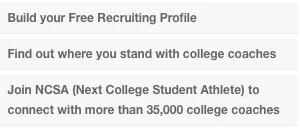Graduate Transfer Are Not Free Agency
Chris Foster of the Los Angeles Times:
“I think we’ve reached a point with the epidemic of transfers that it would probably make sense to have everybody sit out a year regardless of circumstances,” said Arizona State Coach Herb Sendek, whose second-leading scorer, Jermaine Marshall, left Penn State after graduating. “We really have a free agency market in the spring.”
The last sentence deserves some scrutiny. Like all other transfers, graduate transfers need permission to contact another institution. If a coach denies permission to contact and it is upheld on appeal, the athlete cannot accept an athletic scholarship at a potential transfer destination.
But let’s say an athlete is both willing to transfer without being recruited by the next institution and is willing to walk-on. They still cannot play immediately without the support of their previous institution under either the graduate transfer exception or graduate transfer waiver. This is the text of Bylaw 14.1.8.1:
A graduate student who is enrolled in a graduate or professional school of an institution other than the institution from which he or she previously received a baccalaureate degree may participate in intercollegiate athletics if the student fulfills the conditions of the one-time transfer exception set forth in Bylaw 14.5.5.2.10 and has eligibility remaining per Bylaw 14.2. A graduate student who does not meet the one-time transfer exception due to the restrictions of Bylaw 14.5.5.2.10-(a) shall qualify for this exception, provided: (Adopted: 1/9/96 effective 8/1/96, Revised: 4/27/06, 1/6/07 effective 8/1/07, 4/28/11 effective 8/1/11)
(a) The student fulfills the remaining conditions of Bylaw 14.5.5.2.10;
(b) The student has at least one season of competition remaining; and
(c) The student’s previous institution did not renew his or her athletically related financial aid for the following academic year.
The remaining conditions of Bylaw 14.5.5.2.10 include the following:
(d) If the student is transferring from an NCAA or NAIA member institution, the student’s previous institution shall certify in writing that it has no objection to the student being granted an exception to the transfer-residence requirement.
So if an institution insists on renewing an athlete’s scholarship and/or refuses to grant the release to use the one-time transfer exception, the athlete cannot transfer and play immediately under the graduate transfer exception. Similarly, the graduate transfer waiver guidelines start with this requirement:
- A letter from previous institution (e.g., athletics director, faculty athletics representative, president) stating it does not object to the student-athlete being immediately eligible.
And if an athlete graduates but does not receive the required release from the previous institution, the NCAA does not offer them another option, as seen in this waiver guideline:
Requests to Waive the Transfer-Residency Requirement Due to Institutional Denial of Transfer Release. The subcommittee reaffirmed its 1996 directive regarding waiver requests of the one-time transfer legislation when an NCAA institution has denied a one- time transfer release to a student-athlete. The subcommittee did not believe it should overturn these types of decisions and that the staff should deny these cases during the staff’s first review of the case on behalf of the subcommittee.
Perhaps there have been athletes who transferred after graduating and played immediately over the objections of their previous institution. But that would require other extenuating circumstances beyond simply graduating and perhaps wanting to pursue a graduate degree not offered at the first institution.
The vast majority of graduate transfers were able to transfer and play immediately because their previous institutions let them. It is not free agency in the sense that the athlete completed their obligation and was able to play somewhere else immediately no matter what the previous school did. It is only free agency in the sense that the athlete was released or their option was declined and now they can look for another team. And even in those cases, the institution can choose to restrict or frustrate an athlete’s transfer to certain schools.
So when coaches say they want the NCAA to restrict graduate transfers to avoid “free agency”, they are forgetting or ignoring the tools the NCAA already gives them in the transfer process, even for graduate students. What they are in fact asking for is some combination of the following:
- For the NCAA to save them from having to make the unpopular decision to deny permission to contact or the release to play immediately; and/or
- For the NCAA to prevent School A from letting an athlete transfer to School B and play right away even though School A has no problem with it.
To the extent graduate transfers are “free agency”, it is because other coaches and athletic directors allow athletes to become “free agents”. But only in the loosest sense of the word and hardly the lawless free-for-all as it is often portrayed.


